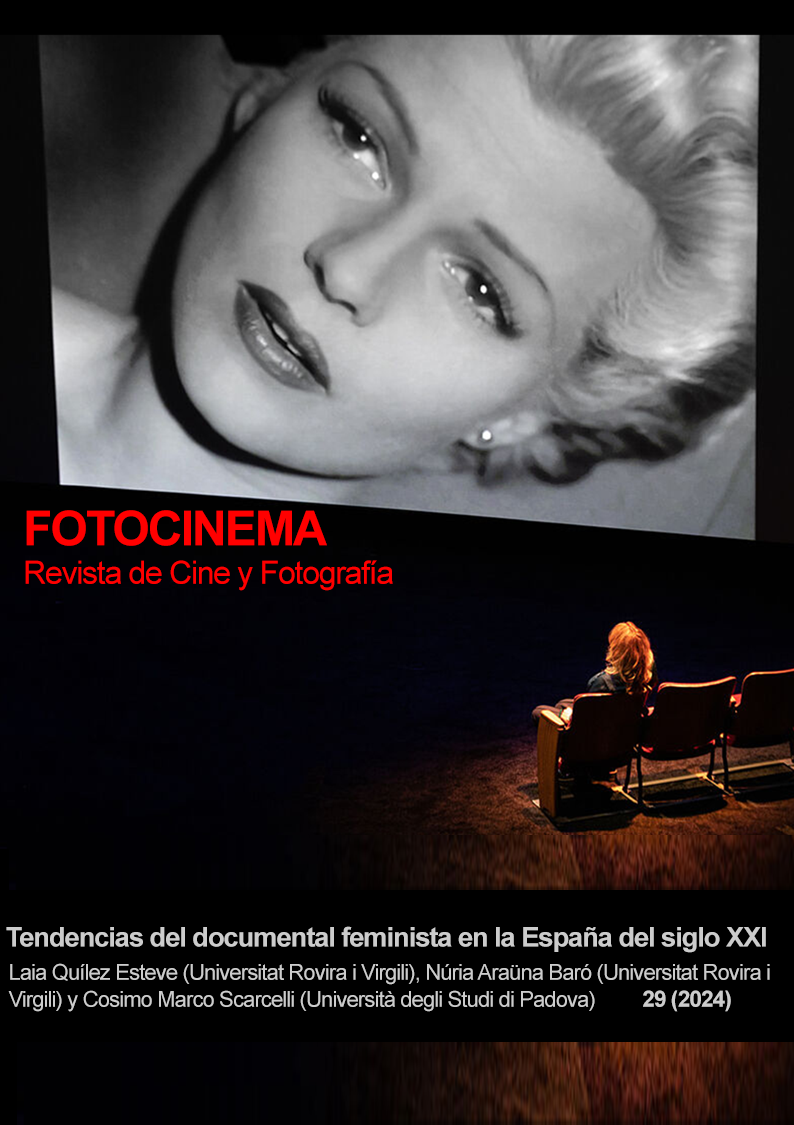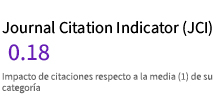Masculinidad y autoviolencia: representación del pasado, crisis del relato marco y desviaciones de la focalización en Aftersun (Charlotte Wells, 2022)
DOI:
https://doi.org/10.24310/fotocinema.29.2024.19683Keywords:
masculinities, fatherhood, gender studies, narratology, flashback, memoryAbstract
Throughout this article, we carry out an interdisciplinary analysis of Aftersun (Charlote Wells, 2022), a cinematographic work with a special aesthetic and thematic relevance, insofar as it poses the damaging effects on men of models of masculinity and fatherhood. On one hand, it reveals how those effects arise because of the self-demands of codes, roles, stereotypes, and beliefs rooted in the social and cultural imaginary. On the other hand, it warns against self-violence as an unconscious answer in the face of the pressure of obligations and commands of the traditional paradigm, which are impossible of performing. The feature film by the British director addresses issues that have rarely been seen in cinema until now. It achieves its goals by means of a particular narrative structure where temporal anachronies and memory play an essential role in conveying to what extent those models can be inherited by ignoring the causes that lead the male gender to a tragic destiny. Consequently, narratological theory allows us to isolate the main narrative phenomena of the film and also find out its discourse with the help of a gender studies approach.
Downloads
Metrics
Publication Facts
Reviewer profiles N/A
Author statements
Indexed in
-
—
- Academic society
- N/A
- Publisher
- Universidad de Málaga
References
Bacete González, R. (2019). Nuevos hombres buenos. La masculinidad en la era del feminismo. Planeta.
Balgane, C. (2013). Macho se hace a golpes. Revista: Tram[p]as de la Comunicación y la Cultura, 7, 85-90.
Booth, W. (1982). The Rethoric of Fiction. The University of Chicago Press.
Bordwell, D. (1996). La narración en el cine de ficción. Paidós.
Bordwell, D. (1997). El cine clásico de Hollywood. Paidós
Bordwell, D. (2007). Poetics of Cinema. Routledge.
Bordwell, D., Thompson, K. and Smith, J. (2017). Film art: An introduction. McGraw-Hill.
Branigan, E. (1992). Narrative Comprehension and Film. Routledge.
Burch, N. (1987). El tragaluz del infinito. Cátedra.
Cohan, S. and Rae Hark, I. (eds.) (1993). Screening the Male: Exploring Masculinities in the Hollywood Cinema. Routledge.
Chatman, S. (1990). Coming to Terms. The Rhetoric of Narrative in Fiction and Film. Cornell UP.
Cuevas, E. (2001). Focalización en los relatos audiovisuales. Trípodos, 11, 123-136.
Fouz-Hernández, S. and Martínez-Expósito, A. (2007). Live Flesh: The Male Body in Contemporary Spanish Cinema. I.B. Tauris.
Gaudreault, A. y Jost, F. (1995). El relato cinematográfico. Cine y narratología. Paidós.
Genette, G. (1989). Figuras III. Lumen.
Genette, G. (1998). Nuevo discurso del método. Cátedra.
Gómez Tarín, F. J. (2004). Tres procedimientos discursivos en las cinematografías del cambio de siglo. En N. Mínguez Arranz y N. Villagra García (Eds.), La comunicación: nuevos discursos y perspectivas (pp. 191-198). Edipo.
Gómez Tarín, F. J. (2013). El punto de vista en el audiovisual contemporáneo: una reformulación de conceptos enunciativos y narrativos. En M. Álvarez (Ed.), Imágenes conscientes. AutorrepresentacioneS#2 (pp. 27-45). Éditions Orbis Tertius.
Kaufman, M. (octubre de 1999). Las siete P's de la violencia de los hombres. Toronto, versión electrónica. www.michaelkaufman.com. https://bit.ly/3ToG9uW
Kimmel, M. S. (1997). Homofobia, temor, vergüenza y silencio en la identidad masculina. En T. Valdés y J. Olavarría (Eds.), Masculinidad/es (pp. 49-62). Isis Internacional / Flacso.
Marañón, I. (2020). Educar a un niño en el feminismo. Plataforma Editorial
Navascués, J. (1992). Adán Buenosayres, una novela total (Estudio narratológico). Eunsa.
Monterde, J. E. (2001). Un nuevo cine llamado Free Cinema. En C. F. Heredero y J. E. Monterde (Eds.), En torno al Free Cinema. La tradición realista del cine británico (pp. 13-17). Instituto Valenciano de Cinematografía Ricardo Muñoz Suay.
Planes Pedreño, J. A. (2018). El presente devorado por el pasado: declinaciones del flashback metaléptico y sus resonancias en el discurso memorístico de La prima Angélica. Hispanic Research Journal, 19(1), 89-104. https://doi.org/10.1080/14682737.2018.1419005
Planes Pedreño, J. A. (2020). Actitudes ante el recuerdo en el cine de ficción de Carlos Saura durante el tardofranquismo y la Transición Española: de la memoria activa de Los ojos vendados (1978) a la memoria pasiva de Dulces horas (1982). Historia y comunicación social, 25(1), 151-159. https://doi.org/10.5209/hics.69233
Planes, J. A., García, A. N. y Pérez-Morán, E. (2022). Flashbacks in Netflix Original TV Series (2013–2017): Predominant Categories, Formal Features, and Semantic Effects. International Journal of Communication, 16, 3443-3469.
Powrie, P., Davis, Ann and Babington, B. (eds.) (2004). The Trouble with Men: Masculinities in European and Hollywood Cinema. Wallflower Press.
Ramahí García, D. (2015). El lugar del relato en la nueva frontera digital sobre la que se mueve la cinematografía. Duncan Jones y la narratología. Revista de la Escuela Jacobea de Posgrado, 19, diciembre, 95-108.
Ramírez, J. C., Gómez, M. P., Gutiérrez de la Torre, N. C. y Sucilla, M. V. (2017). Masculinidades y emociones como construcciones socioculturales: Una Revisión Bibliométrica. Masculinidades and Social Changes, 6(3), 217-256. https://doi.org/10.17583/mcs.2017.2734
Ranea Triviño, B. (2021). Desarmar la masculinidad. Los hombres ante la era del feminismo. Catarata.
Salazar Benítez, O. (2018). El hombre que (no) deberíamos ser. La revolución masculina que tantas mujeres llevan siglos esperando. Planeta.
Salazar Benítez, O. (2019). We too. Brújula para jóvenes feministas. Planeta.
Salguero Velázquez, A., Córdoba Basulto, D. y Sapién López, S. (2018). Masculinidad y paternidad: Los riesgos en la salud a partir de los aprendizajes de género. Psicología y Salud, 28(1), 37-44. https://doi.org/10.25009/pys.v28i1.2546
Sambade Baquerín, I. (2020). Masculinidades, violencia e igualdad. El (auto) control de los hombres como estrategia de poder social. Ediciones Universidad de Valladolid.
Sorolla-Romero, T. (2022). El tiempo de los amnésicos. Narrativas fracturadas y delirantes del cine contemporáneo. Publicacions de la Universitat de Valencia.
Stam, R. (2001). Teorías del cine. Paidós.
Vásconez-Merino, G. X. y Carpio-Arias, F. (2020). La estética posmoderna en el cine: una aproximación teórica. Kairós. Revista de ciencias económicas, jurídicas y administrativas, 3(5), 52-61. https://doi.org/10.37135/kai.03.05.05
Vilche, Laura (8 de agosto de 2017). La primera víctima del mandato de masculinidad es el hombre. Lacapital.com. https://bit.ly/3IH55sT
Downloads
Published
Versions
- 2024-07-19 (2)
- 2024-07-19 (1)
How to Cite
Issue
Section
License
Copyright (c) 2024 José Antonio Planes Pedreño, Javier Juárez Rodríguez

This work is licensed under a Creative Commons Attribution-NonCommercial-NoDerivatives 4.0 International License.
All contents published in Fotocinema Revista científica de cine y fotografía are protected under the Creative Commons Attribution-NonCommercial-ShareAlike 4.0 International (CC BY-NC-SA 4.0) license. All about this license is available in the following link: <http://creativecommons.org/licenses/by-nc-sa/4.0>
Users can copy, use, redistribute, share and exhibit publicly as long as:
- The original source and authorship of the material are cited (Journal, Publisher and URL of the work).
- It is not used for comercial purposes.
- The existence of the license and its especifications are mentioned.
There are two sets of authors’ rights: moral and property rights. Moral rights are perpetual prerogatives, unrenounceable, not-transferable, unalienable, imprescriptible and inembargable. According to authors’ rights legislation, Fotocinema. Revista científica de cine y fotografía recognizes and respects authors moral rights, as well as the ownership of property rights, which will be transferred to University of Malaga in open access. The property rights are referred to the benefits that are gained by the use or the dissemination of works. Fotocinema. Revista científica de cine y fotografía is published in an open access form and it is exclusively licenced by any means for doing or authorising distribution, dissemination, reproduction, , adaptation, translation or arrangement of works.
Authors are responsable for obtaining the necessary permission to use copyrighted images.














13.png)



